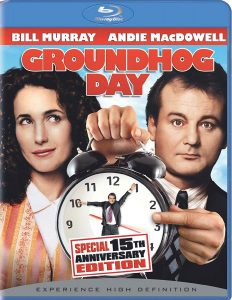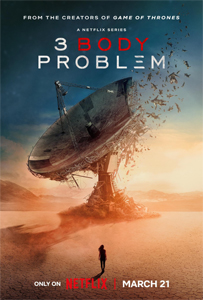Every quarter century we get a sci-fi epic about how God can perhaps be found at the endpoint of scientific advancement – “2001” (1968), “Contact” (1997) and now “3 Body Problem.” Befitting the modern age, the latter is a Netflix series rather than a movie. The recently aired Season 1 is based on the first book in the series by Chinese writer Liu Cixin that started in 2008.
Overseen by David Benioff and D. B. Weiss (“Game of Thrones”) and Alexander Woo (“The Terror” Season 2), “3BP” is a grand and stylish, yet personalized and grounded, meditation on how far humans have come and how far they have to go. With the similarly pricey “Westworld” and “The Peripheral” canceled mid-story, “3BP” takes the baton, and we can only hope further seasons will adapt the next two books.
The story flashes back to 1977, then throws its imagination ahead hundreds of years, but “3BP” has a lot to say about the early 21st century. We start in the past with Chinese woman Ye (Zine Tseng, and later Rosalind Chao), who experiences Mao’s atrocities on her family and herself. We end up in a near future where people in the most “civilized” parts of the world – London is the story’s home base – have adjusted to universal mass spying as a normal part of life.
“3 Body Problem” Season 1 (2024)
Netflix, 8 episodes
Creators: David Benioff, D. B. Weiss and Alexander Woo; Liu Cixin (novel)
Stars: Jovan Adepo, Liam Cunningham, Eiza González
The spying is done by aliens rather than governments, granted, but it’s clear this is because they are more advanced, not because they are less moral. “3BP” does not particular admire the human race, but – refreshingly for 2024 – it’s not relentlessly dark and depressing. Benedict Wong (the MCU’s Wong) infuses bedraggled humor into government agent Clarence “Da” Shi, who gets shuffled between so many British alphabet agencies that he can’t remember his current one – “PDF? PDA? … PDC! That’s it!”
A human story of humanity’s plight
“3BP’s” heart comes from five 30-ish Oxford-graduated scientists. This is diversity done well; we simply see via the writing and performances that these five friends from various walks of life love each other. “I never had many friends, but I had you guys, and that always felt like enough,” says Will (Alex Sharp), who is dying of pancreatic cancer. Awww.

Also among the group are Jack (John Bradley), who has become rich by inventing new flavors of chips (crisps, to Britons); Jin (Jess Hong), a genius at space exploration; Auggie (Eiza Gonzalez), an Oppenheimer sort who invents a nanofiber that gets used as a horrifying weapon in the stunning episode 5; and Saul (Jovan Adepo).
Saul is the “glue guy” in the group, also functioning as an overwhelmed audience surrogate. He’s always there for the other four, but when offered a spot on a think tank for defeating the aliens (who will arrive in 400 years), he wants nothing to do with it.
A team of five writers pens a seemingly jumbled and heady tale of the aliens’ long-distance encroachment into human society, yet I was never confused. Characters bob in and out of the spotlight; at various times I could suggest Ye, Jin, the detective or Saul are the driving force. Or even Irish-brogued PDC head Thomas Wade (Liam Cunningham), an almost inhuman type of human who will do whatever it takes to save humanity – including killing innocent humans.
I wasn’t really into the VR helmets (very much calling to mind “The Peripheral”) that show our heroes the aliens’ plight on a homeworld bombarded by the gravitational forces of a three-sun system. I might’ve liked more clues about why the aliens are targeting specific humans for death, without any apparent motive. I’d guess they might be able to predict the future, a parallel with the mind-tripping later seasons of “Westworld.”
A sophonic symphony
But I got into most of the science, which can fairly be categorized as hard-SF (as with “2001” and “Contact”), although it bends some rules. The title refers both to the aliens’ system and to Ye’s discovery involving the gravity of the sun, Earth and Jupiter. She finds that the sun boosts signals in space, thus allowing for first contact in the late Seventies. But the aliens are as far beyond humans as humans are from bugs, so most of the amazing tech comes from their end.
I particularly appreciate the explanation of “sophons” (although I have to remind myself that the accented characters aren’t saying “cellphones”). Building upon real scientific discoveries of how subatomic particles don’t follow familiar laws of cause and effect, and space and time, “3BP” introduces universal spying devices. The aliens know everything we do, immediately. Privacy is dead and buried.
Chillingly, an illusion of privacy and spiritual contemplation still exists – most tellingly in moments where pro-alien humans commune with a “God” we suspect is far less benign than the ones in “2001” and “Contact.” In his cozy office on an ocean vessel, the leader of the pro-invasion group, Mike Evans (Jonathan Pryce), speaks to the alien leader, calling her “my Lord.”
The communication device resembles a circular old radio, like a steampunk HAL-9000. The alien Lord gradually learns key information about human nature from Evans; this is a show where conversations can be as scary and suspenseful as action sequences. And they must be, because there isn’t much of the latter.
Because of the hard science, verisimilitude and personalization of the characters, “3BP” makes mass spying and alien invasions fresh and crucial again. The human race might be convincingly doomed in “3 Body Problem,” but what’s really amazing about this series is that it makes me care about its fate.

